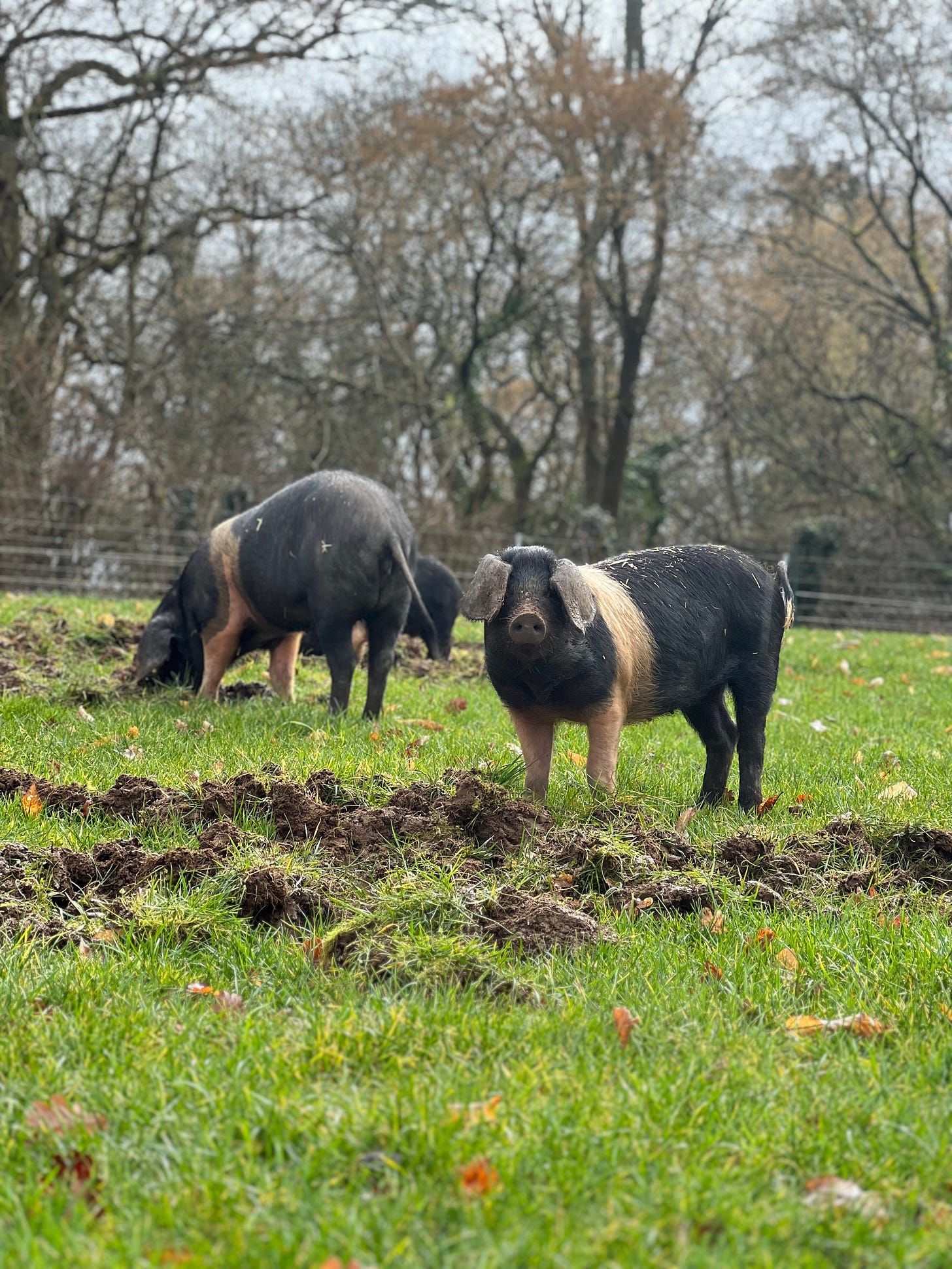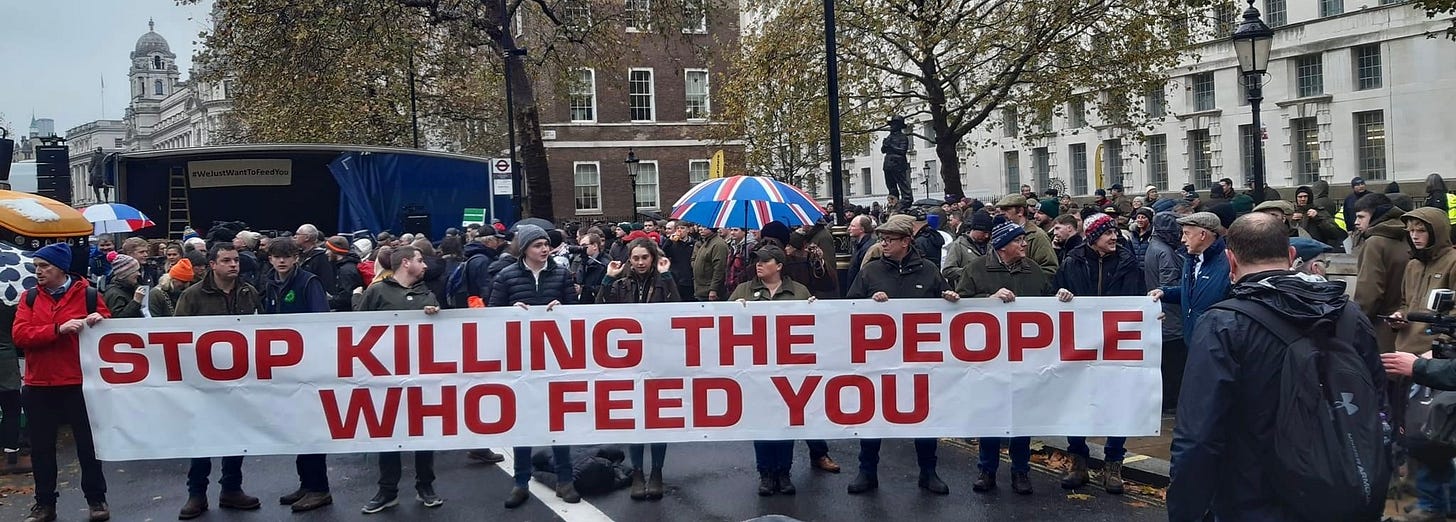Farms vs Housing
The War for Land
There’s a quiet war unfolding in the British countryside, and it’s not just about tractors and policy. It’s about land. Who controls it. What it’s used for. And what kind of food system we’re handing down to future generations.
This isn’t abstract for me. As a small-scale farmer, I’ve spent the last two years fighting a very real battle with our local council for planning permission. The hearing took place in November last year, and we were told to expect a decision within four to six weeks. Months later, we’re still waiting.
This decision could make or break our farm. We’ve poured every penny of our savings into this fight, determined to keep going. When we started this battle, our son was just nine months old. He’s now three, and we’ve welcomed a second child since. We’ve done everything we can to hold on, but with no certainty, living in limbo gets harder each week. I wrote more about our journey in my post; The Final Stand.
The Land That Grounds Us
Our farm comprises two sites: our owned land where our breeding sows, boars, and ornamental Highland cows live, and a rented site for our meat herd, which we move in a regenerative system. From the moment we first stepped foot on our land, it felt like it was meant to be. Set atop a hill with panoramic views, it’s not just a scenic haven. It’s the heart of our purpose.
The beauty of this land goes beyond what the eye can see. It’s in the rhythm of the animals, the care in every corner, and the hope Matt and I share for building a resilient, high welfare, transparent food system. Sitting at sunset with the pigs or cows is my happy place. It’s the quiet reminder of why we keep going.
The Pressure Builds
In our local area, development is creeping in fast. Just down the road, a once-productive field that welcomed grazing sheep each spring has been sold off to developers. Fences now surround it, waiting for concrete and construction. Another plot nearby has been cleared for a massive solar farm. Quietly and quickly, farmland is being lost. And with every sale, we’re not just losing open space. We’re losing food security.
Even more frustrating is the double standard in how planning rules are applied. We see “rural dwellings” in the form of static caravans approved all over the district, while our request, backed by genuine agricultural need, has been fought at every step. Neighbours knock down stables to build gyms and annexes. A property next door even had its agricultural tie removed, while we’ve been desperately trying to secure one. We've watched other farms gain planning where we haven't, and the inconsistency makes the process feel arbitrary and deeply unjust.
Why I'm Writing This Now
The release of the Share the Land report this week brought everything to the surface. It reminded me that our story is just one thread in a national crisis. Farmers across the UK are facing immense pressure from planning laws to inheritance tax changes to the creeping threat of compulsory land acquisition.
At the heart of it all is land and how we value it.
This isn't just about where houses go. It's about what kind of food system we build. What kind of countryside we want. Whether we can feed ourselves with dignity and sustainability. And whether farming has a future at all.
The Bigger Picture: A Framework to Watch
The UK government’s proposed Land Use Framework lays out plans to juggle land demands for housing, climate goals, nature restoration, and energy infrastructure. It’s ambitious but quietly devastating for agriculture.
The framework states that 9% of England’s farmland, around 760,000 hectares, will need to be taken out of food production. That’s one in every ten acres. The government says this land will be “low productivity,” but anyone who farms knows that grazing land, fallow fields, and rotational pastures all play crucial roles in sustainable systems. These so-called “less productive” plots often support biodiversity and animal welfare in ways the data doesn’t capture.
Meanwhile, the Planning and Infrastructure Bill currently working its way through Parliament threatens to strip away environmental protections. Bat surveys scrapped. Ancient woodland protections weakened. Chalk streams and heritage landscapes placed at risk. Thirty-two leading nature organisations, from the RSPB to the Wildlife Trusts, have warned that this bill could cause irreversible ecological damage.
And yet, small regenerative farms, those of us building soil health, restoring habitat, and producing local food, are left fighting tooth and nail for the right to exist.
What “Share the Land” Proposes
The Share the Land report by the Landworkers’ Alliance presents a compelling alternative. It lays out five land use scenarios, exploring what a more agroecological future could look like, one that balances food production with climate action and biodiversity.
The findings show that we don’t need to sacrifice food for nature. With moderate changes, we can meet the nutritional needs of 71 million people without expanding industrial farming. One scenario proposes shifting animal agriculture away from factory systems and into regenerative, mixed-use models that integrate well with nature. Instead of reducing meat consumption across the board, it’s about transforming how we produce meat, moving from extractive systems to those that restore landscapes.
These findings confirm what I see on our own farm: when animals are raised with care, in balance with nature, they’re not part of the problem. They’re part of the solution.
Land Use Isn’t Just About Housing
The debate is too often framed as “houses vs farmland,” but the real question is: why isn’t farmland considered national security? We import nearly half our food. Every time a field is lost to tarmac, that number climbs. Compulsory purchase orders, rezoning for industrial use, and unchecked planning threaten the land that feeds us.
We need homes, yes. But we also need food, nature, clean water, and climate resilience. Our current path sacrifices too much for too little.
The Human Cost of These Policies
We’ve lived through the cost of bad planning policy. At the height of our battle, we were homeless with a nine-month-old baby. We’ve moved through spare rooms, hotels, and caravans while trying to keep our animals alive and our dream afloat. Farrowing piglets in the dead of winter without being on site has meant avoidable losses. And the emotional toll, on our relationship, our finances, and our mental health, has been profound.
It’s not just land that’s being broken by this system. It’s people too.
Still Standing, Still Speaking
I came to Substack not just to share our story but to speak up for farms like ours across the country. If we lose this fight, we may not be able to continue producing pork. But I’ll still be here, writing, building an agricultural education platform, and working toward a better food system.
Because farming deserves a future. And land deserves to be shared, not sacrificed.
There Is Another Way
The Share the Land report offers hope:
Land used for food, nature, and people in balance
Farms that integrate trees, wetlands, and wildlife corridors
Local food webs that build resilience and shorten supply chains
A vision for a Britain that feeds itself fairly, with care for soil and soul
But vision isn’t enough. We need public support, political courage, and urgent action. Because once land is lost, it doesn’t come back.
We have to stop asking: “How do we fit more houses in the countryside?”
And start asking: “How do we steward our land to nourish and sustain everyone, now and for generations to come?”
This post follows on from The True Cost of Cheap Food. If you missed that, I recommend starting there. The fight for farming isn’t just about food. It’s about land, people, and power.
If this post moved you, please share it, subscribe, or just leave a comment.
Every story matters.
Helen
🐷 Me, My Pigs and I






The planning system is broken and illogical while the lack of joined up thinking around environmental and economic sustainability, human resilience, food production and land use is not set to improve while metropolitan rulers have no understanding of rural life.
What do you think of ‘Regenesis’ by G Monbiot? I found it really interesting — on soil especially